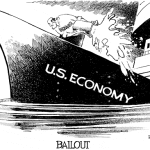The ‘Great Authors in 10 Quotes’ is an ongoing series meant to expose libertarian-leaning readership with some of the most noteworthy thinkers in the classical liberal, libertarian, and anarchist traditions. The challenge is finding material deep enough to reflect an author’s thought, while still being accessible for a brand new reader. We encourage readers to leave comments linking to other written works and videos by the author.
Murray Newton Rothbard (1926 -1995) was the single most influential figure of the post-WWII American libertarian movement. Rothbard synthesized concepts from Austrian economics, classical liberalism, individualist anarchism, and other sources to codify much of the thought underlying contemporary libertarianism. Rothbard was a student of Austrian School economist Ludwig von Mises and former associate of libertarian intellectuals such as Ayn Rand and Karl Hess. Rothbard published more than 20 works on libertarian topics ranging from economics, to history, to proposals for social activism.






